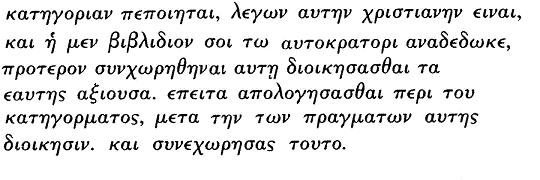"The persons accused of Christianity had a convenient time allowed them to settle their domestic concerns, and to prepare their answer."(49)
This observation had been suggested, partly by a general expression of Cyprian (de Lapsis, p. 88. Edit. Fell. Amstelod. 1700), and more especially by the second Apology of Justin Martyr, who gives a particular and curious example of this legal delay.
The expressions of Cyprian, "dies negantibus praestitutus, etc.", which Mr. Davis most prudently suppresses, are illustrated by Mosheim in the following words:
"Primum qui delati erant aut suspecti, illis certum dierum spatium judex defimebat, quo decurrente, secum deliberare poterant, utrum profiteri Christum an negare mallent; explorandae fidei prae finiebantur dies, per hoc tempus liberi manebant in domibus suis; nec impediebat aliquis quod cx consequentibus apparet, ne fugâ sibi consulerent. Satis hoc erat humanum." (De Rebus Christianis ante Constantinum, p. 480.)
The practice of Egypt was sometimes more expeditious and severe; but this humane indulgence was still allowed in Africa during the persecution of Decius.
But my appeal to Justin Martyr is encountered by Mr. Davis with the following declaration: (50)
"The reader will observe, that Mr. Gibbon does not make any reference to any section or division of this part of Justin's work; with what view we may shrewdly suspect, when I tell him, that after an accurate perusal of the whole second Apology, I can boldly affirm, that the following instance is the only one that bears the most distant similitude to what Mr. Gibbon relates as above on the authority of Justin. What I find in Justin is as follows: "A woman being converted to Christianity, is afraid to associate with her husband, because he is an abandoned reprobate, lest she should partake of his sins. Her husband, not being able to accuse her, vents his rage in this manner on one Ptolemaeus, a teacher of Christianity, and who had converted her, etc."
Mr. Davis then proceeds to relate the severities inflicted on Ptolemaeus, who made a frank and instant profession of his faith: and he sternly exclaims, that if I take every opportunity of passing encomiums on the humanity of Roman magistrates, it is incumbent on me to produce better evidence than this.
His demand may be easily satisfied, and I need only for that purpose transcribe and translate the words of Justin, which immediately precede the Greek quotation alleged at the bottom of my adversary's page. I am possessed of two editions of Justin Martyr, that of Cambridge, 1768, in 8vo, by Dr. Ashton, who only published the two Apologies; and that of all his works, published in fol. Paris, 1742, by the Benedictines of the Congregation of St. Maar: the following curious passage may be found, p. 164, of the former, and p. 89 of the latter Edition.

"He brought an accusation against her, saying, that she was a Christian. But she presented a petition to the Emperor, praying that she might first be allowed to settle her domestic concerns; and promising, that after she had settled them, she would then put in her answer to the accusation. This you granted."
I disdain to add a single reflection; nor shall I qualify the conduct of my adversary with any of those harsh epithets, which might be interpreted as the expressions of resentment, though I should be constrained to use them as the only words in the English language, which could accurately represent my cool and unprejudiced sentiments.